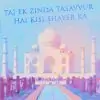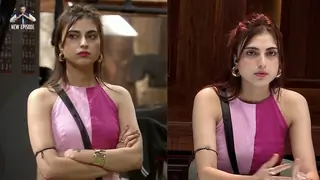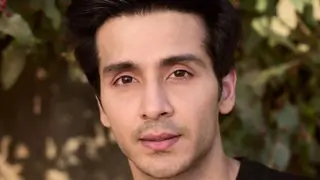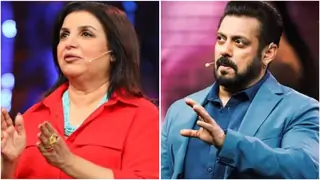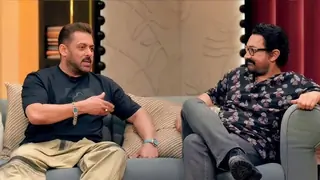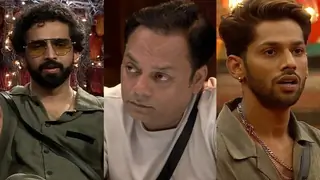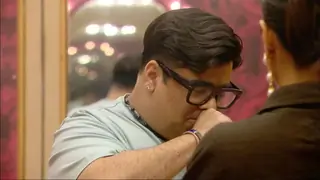Kavi Pradeep
Kavi Pradeep (1915-1998) was a popular Indian poet and lyricist.
< =text/> //
Early life
Born Ramchandra Barayanji Dwivedi in 1915 into a middle-class Brahmin family in the small central Indian town of Badnagar, in Madhya Pradesh state. Since his early student days in Madhya Pradesh and later in Uttar Pradesh, he had a passion for writing and rendering Hindi poetry. He hypnotized the audience at kavi sammelans (poet's gatherings) with his inimitable style. It was during this time he changed his name to Pradeep. After graduating from Lucknow University in 1939, he decided to join a teacher's course and teaching.
Pradeep was invited to a Kavi Sammelan in Bombay (now Mumbai) where he was offered his first film Kangan by the late Himanshu Roy of Bombay Talkies. The film starred Devika Rani and Ashok Kumar. Pradeep Shifted to Bombay and wrote four songs for the film, all of which became very popular and sung three of the songs himself.
He next film was "Bandhan" produced by S Mukherjee and directed by Gyan Mukherjee. This time he wrote all the songs which became huge hits. The Most notable is "Chal chal re naujawan" (translation: Come on oh youth) which made waves since the Indian freedom movement was at a crucial juncture.
Golden Era
He worked on five more movies for Bombay Talkies which included Punarmilan, Jhoola, Naya Sansar, Anjan and Kismet. Kismet is known for its patriotic song "Aj Himalay ki choti se phir hamne lalkara hai...door hato ae duniyawalon Hindustan hamara hai" ("Go away outsiders, India is ours"). Mashaal was his next film and it features the extremely popular song 'Upar gagan vishal niche gahara pataal, bich mein dharati, wah mere malik tune kiya kamal...' sung by Manna Dey. Kavi Pradeep was at his creative zenith when he wrote for the films Nastik and Jagruti. He even lent his voice for the evergreen song 'Dekh tere sansar ki halat kya ho gayi bhagwaan kitna badal gaya insaan...' (translation: Look at what has happened to your world, O god. Man has changed so much). Jagruti is considered to be among his best work for one movie since it includes hit songs such as 'Aao bachchon tumhe dikhayen jhanki Hindustan ki, iss mitti se tilak karo, yeh dharti hai balidan ki...' (translation: Come children. Let me briefly show you Hindustan. Smear its sand on your forehead for its earth is full of sacrifices) , 'Hum laye hain toofan se kishti nikal ke iss desh ko rakhna mere bachon sambhal ke...' and 'Dedi humein azadi bina khadak bina dhal, Sabarmati ke sant tune kar diya kamal...' (translation: You gave us freedom without shield and sword. O saint of Sabarmati you have worked wonders)
His songs were so popular that movies would get repeat audiences just to listen to his soulful songs. Kavi Pradeep always believed in writing songs with a meaning and made sure the songs he wrote fit into the situation of the movie. The popularity of his songs were also due to his down to earth lyrics and simple language that was well understood by everyone. He stayed in the Irla area of the Mumbai suburb of Vile Parle until he died.
Later life
By the 1960's, the popularity of his songs was on the wane and film producers who were looking for western music and fast numbers avoided him. However he managed to prove his detractors wrong with films Talaaq, a Rajendra Kumar starrer and Paigam starring Dilip Kumar, Raaj Kumar and Vyjayantimala. With 'Insan ka insan se ho bhaichara, yahi paigam hamara..' being a highlight. S. Mukerji's Sambandh starring Pradeep Kumar was a movie that ran on the popularity of songs such as 'Chal akela chal akela, tera mela pichche chchuta rahi chal akela...', 'Jo diya tha tumne ek din mujhe phir wohi pyar de do...' and 'Ek karaj mangta hum bachpan udhar de do' written by Kavi Pradeep. He continued to show his brilliance in 1975, when the movie Jai Santoshi Maa was released. For a low budget movie, it matched the collections of another Block Buster "Sholay". For months theatre's screening the movie, held the housefull boards high. Ladies would perform poojas when the immortal song "Mein to aarti utaroon re Santoshi mata ki...." was played in the theatres. Almost synonymous to his Kismet song "Aj Himalay ki choti se phir hamne lalkara hai..", the reel would be rewound and played many times to satisfy public demand.
The Patriot
Kismet was his groundbreaking effort since it came at the time of the "Quit India" movement. The country was in strife with all national leaders in Jail. He cleverly wrote "Aj Himalay ki choti se phir hamne lalkara hai...door hato ae duniyawalon Hindustan hamara hai" ("Go away outsiders, India is ours"). The song was supposed to warn the Axis powers, but the Indian public understood the real meaning of the song. Theatres around the country were resounded with "once more" calls once the song ended. The reel had to be rewound and the song was screened again and again. Kismet made Box Office history for its time by running for 3-1/2 years in one theatre. The British realized the true meaning of his songs and issued a warrant for his arrest. This forced Kavi Pradeep underground to avoid arrest.
He continued his patriotic zeal with renewed vigor after Independence in movies such as Jagruti, 'Dedi humein azadi bina khadak bina dhal, Sabarmati ke sant tune kar diya kamal...' is considered to be his tribute to Mahatma Gandhi.
During 1962(Indo-China) war days, he heard about Param Vir Major Shaitan Singh Bhaati.He was so touched by his sacrifice and bravery that he penned down the lines 'Ae Mere Watan Ke Logon' (translation: O people of my country). This song was originally supposed to be sung by Asha Bhosle, due to a misunderstanding between composer C. Ramchandra and Lata Mangeshkar. Kavi Pradeep though, was adamant about having Lata Mangeshkar sing the song, as he felt that hers was the only voice that could do justice to the number. C. Ramchandra was unsure whether Mangeshkar would agree to sing, so Kavi Pradeep began the task of convincing her to hear the song. On hearing the song she was moved so much that she instantly agreed to sing the song, on condition that Kavi Pradeep be present at the rehearsals.
'Ae Mere Watan Ke Logon' went on to become one of the greatest patriotic songs of the country. It was while listening to Lata Mangeshkar's rendition of 'Ae Mere Watan Ke Logo' that the then Prime Minister of India - Jawaharlal Nehru was moved to tears. For writing the song he was conferred the honour of "Rashtriya Kavi" (National Poet) by the Government Of India.
Popular Songs
"Main to arti utaron radheshyam ki re" (Kangan) "Hawa tum dheere bahao" (Kangan) "Sooni padi re sitar" (Kangan) "Nacho nacho pyare man ke mor" (Punar Milan) "Chal chal re nau javan" (Bandhan) "Chane jor garam babu" (Bandhan) "Piyoo piyoo bol pran papihe" (Bandhan) "Ruk na sako to jao" (Bandhan) "Kheencho kaman kheencho" (Anjan) "Jhoole ke sang jhoolo" (Jhoola) "Na jane kidhar aaj meri nao chali re" (Jhoola) "Main to dilli se dulhan laya re" (Jhoola) "Aaj mausam salona salona re" (Jhoola) "Mere bichhade hue saathi" (Jhoola) "Door hato ae duniya walo Hindustan hamara hai (Kismet) "Dheere dheere aa re badal" (Kismet) "Papiha re, mere piyase" (Kismet) "Ghar ghar mein diwalee hai mere ghar me andhera" (Kismet) "Ab tere siva kaun mera" (Kismet) "Har har mahadeo allah o akbar" (Chal Chal Re Naujawan) "Ram bharose meri gadi" (Girl"s School) "Oopar gagan vishal" (Mashal) "Kiski kismet mein kya likha" (Mashal) "Aaj ashia ke logon ka kafila chala" (Kafila) "Koyal bole ku" (Baap Beti) "Kahna bahjaye bansari" (Nastik) "Jai jai ram raghurai" (Nastik) "Kitna badal gaya insan" (Nastik) "Gagan jhan jhana raja" (Nastik) "Tere phoolon se bhi pyar" (Nastik) "Sabarmati ke sant" (Jagriti) "Hum laye hain toofan se" (Jagriti) "Chalo chalen maa" (Jagriti) "Aao bachacho tumhen dikhayen" (Jagriti) "Tere dwar khada bhagwan" (Waman Avtar) "Kahe ko bisara hari naam, maati ke putle" (Chakradhari) "Doosara o ka dukhada door karne wale" (Dashera) "Tunnaak tunnak bole re mera ektara" (Ram Navmi) "Pinjare ke panchhi re" (Naag Mani) "Koi akh kare chaturai" (Chandi Pooja) "Nai umar ki kaliyo tumko dekh rehiduniya sari" (Talaq) "Bigul baj raha azadi ka" (Talaq) "Mere jeevan mein kiran ban ke" (Talaq) "Mukhada dekhle praani" (Do Bahen) "Insan ka insan se ho bhaichara" (Paigham) "O ameeron ke parameshwar" (Paigham) "Jawani mein akelapan" (Paigham) "O dildaar bolo ek baar" (School Master) 'Aaj suno hum get vida ka garaha" (School Master) 'Sanvariya re apni meera ko bhool na jana" (Aanchal) 'Na jane kahan tum the" (Zindgi aur khwab) 'Aaj ke is insaan ko ye kya hogaya" (Amar Rahe Ye Pyar) 'Sooraj re jalte rahena" (Harishchandra Taramati) 'Toot haiee hai mala" (Harishchandra Taramati) 'Janma bhoomi maa" (Netaji Subhash Chandra Bose) 'Suno suno desh ke hindu - musalman" (Netaji Subhash Chandra Bose) 'Bharat ke liye bhagwan ka ek vardaan hai ganga" (Har har gange) 'Chal akela chal akela" (Har har gange) 'Tum ko to karodon saal hue" (Har har gange) 'Jo diya tha tumne ek din" (Har har gange) 'Ye khushi leke main kya karoon" (Har har gange) 'Sukh dukh dono rehte" (Kabhi dhoop kabhi chhaon) 'Hay re sanjog kya ghadi dikhlai" (Kabhi dhoop kabhi chhaon) 'Chal musafir chal" (Kabhi dhoop kabhi chhaon) 'Jai Jai narayan narayan hari hari" (Haridarshan) 'Pabhu ke bharose han ko gaadi" (Haridarshan) 'Maarnewala hai bhagwan bachanewala hai bhagwan" (Haridarshan) 'Main is paar" (Agni rekha) 'Main to aarti utaron" (Jai Santoshi Maa) 'Yahan wahan jahan tahan" (Jai Santoshi Maa) 'Mat ro mat ro aj" (Jai Santoshi Maa) 'Karati hoon tumhara vrat main" (Jai Santoshi Maa) 'Madad karo santoshi mata" (Jai Santoshi Maa) 'He maruti saari ram katha ka" (Bajrangbali) 'Banjaa hoon main" (Aankha ka tara) - 'Ae Mere Watan Ke Logon"
His songs directly address and have inspired and continue to inspire millions of Indians spanning several generations
Awards
Kavi Pradeep received numerous awards throughout his life. Some of which are:
"Best film lyricist" in 1961 Sangeet Natak Akademi Award in 1961 The Film Journalist Association award The national integration award in 1993 - and the Dada Saheb Phalke Award for the year 1997-1998)
Quotes
About the kind of songs he wrote, Pradeep once said [1] "Love is just a part of life and the love written about today talks about love between the sexes only. But do young men and women have a monopoly where love is concerned. Aren't there different kinds of love that between a mother and her children, between a father and his children, between a bhakt (devotee) and his deity, between a man and his motherland? I chose to write about all these different kinds of love."
Plagiarized works of Kavi Pradeep
Many of Kavi Pradeep's works have been plagiarized in neighboring Pakistan. Songs like "Hum Laye Hain Toofan se Kashti Nikal Ke, Is Desh ko rakhnaa mere bachchon sambhal ke" , "Aao Bachon Tumhe Dikhayen Jhanki Hindustan Ki"' have been plagiarized almost word to word with minor changes like 'desh' to 'mulk' and avoiding references like 'Bharat', 'Hind', 'Bapu' etc.
- It is not confirmed if the songs have been plagiarised or if Kavi himself plagiarised.
Legacy
Kavi Pradeep died at the age of 83 in Mumbai on December 11, 1998. His wife, and his daughters, Ms Sargam and Ms Mitul, have set up the Kavi Pradeep Foundation. They are assisted in their task by former MLA, Mr Avinash Pande. He is also a distant relative of the poet. An award has also been constituted in his memory






